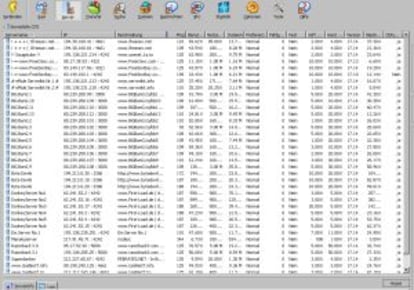Court ruling stops music industry plan to collect IP addresses of pirates
Record companies would have gleaned information with which to sue illegal downloaders

Spain’s Supreme Court has ruled that record companies cannot collect information on people who use peer-to-peer file-sharing networks without their express permission, reaffirming an EU ruling that puts the individual’s right to privacy over the interests of intellectual property rights holders.
The case dates back to 2009, when Spain’s music rights association Promusicae contracted the services of DtecNet Software, which came up with a program that was able to detect computers downloading and sharing music, books and films. The key to this was each users’ IP address, a label that can be used to identify a computer that is connected to the internet.
Using these IP addresses, Promusicae intended to take legal action that would force telephone companies to cut the internet access of people found to be sharing large numbers of files. But to do this it would first require the Spanish Data Protection Agency (AEPD) to exempt it from the legal obligation to inform those affected that it was accessing their internet data. In July 2009, the AEPD turned down the request. Promusicae then took the matter to the Supreme Court.
“The right to data protection goes beyond privacy, and in reality is an entirely different right, which would have been violated by Promusicae,” says Samuel Parra, an expert on data protection.”
In February of this year, the government introduced new legislation that will see file-sharing websites found to have infringed intellectual property rights face fines of up to €300,000, along with removal of their payment processors and advertising. P2P downloads will also be outlawed by limiting the right to private copy.
In January 2012 the WikiLeaks case revealed that the United States, tired with Spain’s apparent lack of protection for intellectual property, had threatened to put Spain on its so-called 301 trade blacklist.
Four months later Spain introduced the so-called Sinde Law, aimed at providing greater protection for rights holders. It included a provision to close infringing sites, although it has never been carried out.
Tu suscripción se está usando en otro dispositivo
¿Quieres añadir otro usuario a tu suscripción?
Si continúas leyendo en este dispositivo, no se podrá leer en el otro.
FlechaTu suscripción se está usando en otro dispositivo y solo puedes acceder a EL PAÍS desde un dispositivo a la vez.
Si quieres compartir tu cuenta, cambia tu suscripción a la modalidad Premium, así podrás añadir otro usuario. Cada uno accederá con su propia cuenta de email, lo que os permitirá personalizar vuestra experiencia en EL PAÍS.
¿Tienes una suscripción de empresa? Accede aquí para contratar más cuentas.
En el caso de no saber quién está usando tu cuenta, te recomendamos cambiar tu contraseña aquí.
Si decides continuar compartiendo tu cuenta, este mensaje se mostrará en tu dispositivo y en el de la otra persona que está usando tu cuenta de forma indefinida, afectando a tu experiencia de lectura. Puedes consultar aquí los términos y condiciones de la suscripción digital.









































